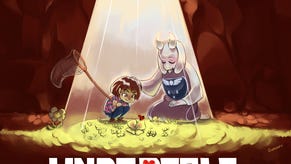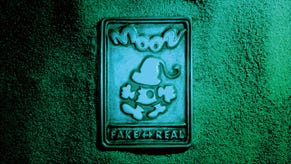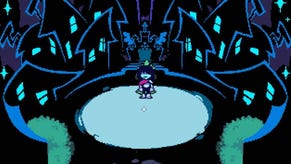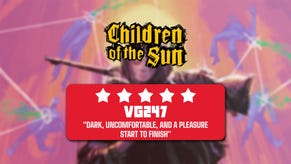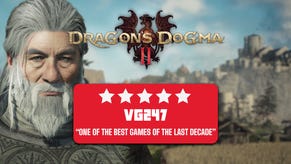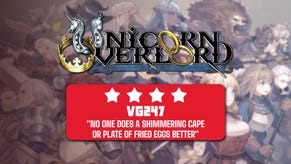Undertale PC Review: The Art of Surprise
Toby Fox's subversion of Japanese RPGs is equal parts inventive, touching, and brilliant.
This article first appeared on USgamer, a partner publication of VG247. Some content, such as this article, has been migrated to VG247 for posterity after USgamer's closure - but it has not been edited or further vetted by the VG247 team.
As a reviewer, the most difficult part about communicating Undertale's greatness is the fact that it works best when you're not aware of the many surprises packed within.
On the surface, Undertale appears to be a loving sendup of the Japanese RPG genre, with many cues taken from Nintendo's EarthBound series of RPGs—specifically, Mother 3, a 2006 Game Boy Advance release that never reached our shores and developed a cult following as a result. But, soon after the tutorial dungeon, Undertale reveals itself to be something much greater than a clever homage. While it uses the grammar of a Japanese RPG as its basic framework, Undertale doesn't aspire to be an especially straightforward take on the genre.
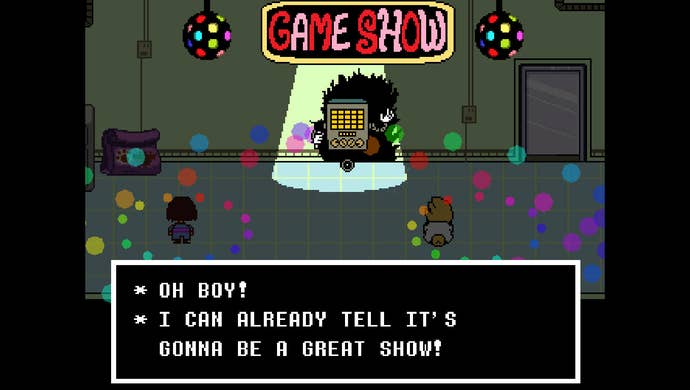
Instead, creator Toby Fox throws RPG fans into a world of intensely familiar commands and tropes, if only to find new ways to play with and subvert them at every possible opportunity. While its understated, dry humor gave me countless smiles, the many times Undertale absolutely committed to some completely unexpected gameplay style or new mechanic for the sake of a single, inspired joke had me breathless from laughing fits. It's the kind of game where, after finishing it, you need to immediately seek out someone else who's reached the end, just to share stories of the many weird things you encountered.
For all of its inventiveness, though, the story of Undertale is extremely simple: your standard mute JRPG protagonist falls into an underground world where a race of monsters was once banished long ago, and things take off from there. This simple premise sets the stage for a tour of the monsters' strange world, which feels a bit like a friendlier version of EarthBound's enigmatic Moonside. Of course, a lot of these monsters bear some hostility towards humans due to past events, and you'll find most are willing to fight first and ask questions later.
And this is where some of Undertale's most inspired mechanics come in. These enemy encounters play out through a turn-based battle system where you're tasked with stopping a meter in the right spot in order to pull off effective attacks. And while we've certainly seen concepts like this play out in previous RPGs (and countless golf sims), dealing with enemy attacks presents an idea I've never seen before: When a foe makes its move, your attention is immediately drawn to a small box at the bottom of the screen. Here, a sort of WarioWare-style microgame plays out, where your avatar—portrayed in the form of a tiny red heart—has to wrangle with a visual metaphor representing the enemy's attack. While dealing with these moves mostly involves dodging a sea of projectiles, Undertale finds a nearly endless amount of ways to play with this very basic concept. And since you only encounter the same enemies a few times—an incredibly smart choice—you won't have to deal with these microgames long after you've already figured them out. Random encounters in most RPGs don't garner much enthusiasm; in Undertale, they typically present an opportunity to see the next weird thing.
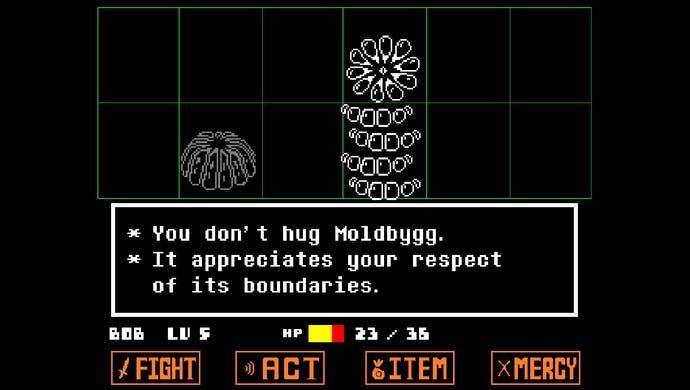
If Undertale's battle system only amounted to the mechanics listed above, it'd still be an incredible amount of fun. What pushes it even further, though, is the fact that you don't necessarily need to fight enemies in order to win battles. Within each enemy encounter is a sort of "combat puzzle" that involves pacifying your opponent through non-hostile means by figuring out ways to address their various (and vocalized) insecurities. And, since each enemy adds their own unique commands to the battle menu, it can often take a few turns to figure out just what to do. Some of these are easy to figure out, like having a flex-off with a flirty bodybuilder, but others take a little more work: In order to dispatch two intimidating canine guards, I had to get them to think I was a puppy who knew how to pet other dogs—all within the context of a turn-based battle system. That may sound absolutely nonsensical, but it makes total sense within Undertale's strange world.
When you're dealing with this kind of gleefully absurdist humor, it's easy to cross the line into obnoxiousness. Thankfully, Undertale tries to keep things low-key, and mostly knows when to pull away from a joke before it wears out its welcome. And it certainly helps that the game has a real world-weary Vonnegutian heart beating under all of its madness. Most of the monsters you meet are emotionally wounded in some way, and you often play the victim to their many insecurities—especially because so many of them develop a needy fixation on you. After meeting Undertale's cast and getting to understand their problems with humanity, it's pretty difficult resorting to those simple, hostile combat options. (Even if some content is sealed off if you choose to take the peaceful route.)
Again, Undertale presents the tricky problem where describing specifics can absolutely ruin the fun for new players, so I'm left with the unfortunate situation of having to be vague but still meaningful. So many of those special moments I've written in my notes definitely shouldn't be shared here; if someone spoiled those slices of Undertale that left me slack-jawed with bewilderment, I doubt they'd have the same effect on me.
But it's more than just this novelty that makes Undertale special: It's loaded with smart puzzles, and its many boss battles and special enemy encounters are invariably complex, multi-stage, and harrowing. Undertale could have easily skated by on its EarthBoundy charms alone, but, by overloading this RPG with almost Too Many Ideas, developer Toby Fox transcended his inspirations and created something equally great—and a lot more daring. It's already one of my favorite games of the year, and, unless you hate fun, it's hard to imagine a scenario where it wouldn't be one of yours.
ConclusionRegardless of its indie status, Undertale is one of the best and most inspired RPGs in years. By playing with traditional, turn-based mechanics, creator Toby Fox has crafted an experience with a legitimate surprise around every corner. If you have a PC and ten bucks, you owe it to yourself to play this amazing game.




